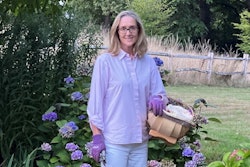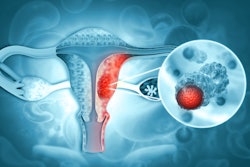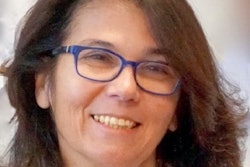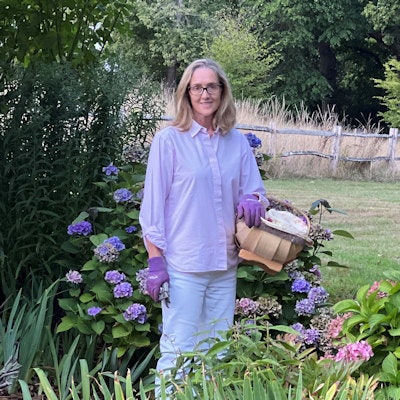
Sustainable radiology, clinical audit, and patient communication -- these are three burning issues to which the European Society of Radiology's (ESR) newly elected Second Vice President Dr. Andrea Rockall will lend her weight before she becomes ECR president in July 2025.
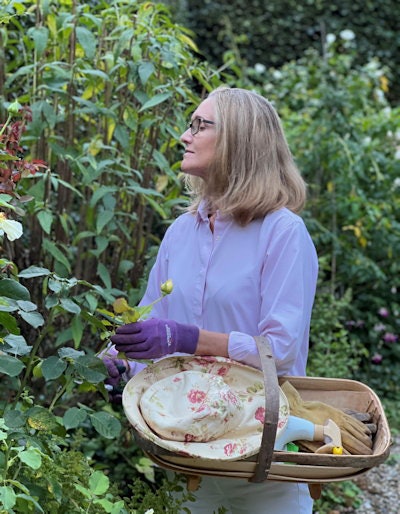 Dr. Andrea Rockall, pictured here at home, is a keen gardener. She also loves walking, skiing, music, and dancing.
Dr. Andrea Rockall, pictured here at home, is a keen gardener. She also loves walking, skiing, music, and dancing.Rockall, professor and clinical chair in radiology at Imperial College London, and honorary consultant at Imperial College Healthcare NHS Trust, has been a long-serving member of many ESR committees. Initially chair of the European Society of Urogenital Radiology's (ESUR) female pelvic imaging working group, she then became chair of ESR's National Societies Committee. Most recently, in January she was elected second vice president of ESR.
Value-based radiology will be key to Rockall's agenda when she takes over as chair of the Value-based Radiology Committee from Dr. Adrian Brady as he becomes ECR president in July 2023, followed by current first vice president, Dr. Carlo Catalano, in July 2024.
"For many years we've been churning out the reporting numbers, without sufficient time to focus on the quality elements such as multidisciplinary team meetings, patient communication and clinical audit. In many countries, there is no time allocated to radiologists to undertake these important tasks, and ESR would like to work on compiling the evidence to demonstrate how these activities bring value to patient care," Rockall told AuntMinnieEurope.com.
Communication focus
One priority in value-based care is patient-radiologist communication, Rockall noted. This is an essential skill in ultrasound, interventional radiology, and in one-stop clinics such as symptomatic breast cancer clinics, where there is a relationship and exchange between patient and specialist. However, in the majority of radiology settings, there is very limited opportunity to discuss findings with the patient.
"Many patients would appreciate being able to discuss important findings with the radiologist. But we're under-resourced, with a relentless increase in workload. Professional societies should be recommending that there be time set aside in the workplace for patient discussion and MD meetings. Part of ESR's work is to help make radiologists accessible to patients," she said.
She pointed to how radiologists could benefit from training in communication, specifically for topics such as "breaking bad news," similar to the training undertaken by oncologists.
"Patient communication skills will be an important focus in the next few years. The challenge will be helping to develop such skills within busy departments that are facing workforce shortages," she noted.
There are plans to improve the status quo: Some departments in Europe have found ways for radiologists to give preliminary reports to patients. While harder in under-resourced departments, simple steps such as providing key images for review by patients and clinicians can help, she noted.
Patient portals are also on the rise, aided by AI tools. With these, patients can access their results on a digital interface, and some groups are developing patient communication aspects such as providing the name and a photograph of the radiologist, how to contact the department with a question, and a patient feedback button. In addition, active links on certain words in the report will provide definitions of more complex radiological or anatomical terms.
With such user-friendly experiences, patients' trust in radiologists will grow, as will radiologists' visibility, she noted.
Green radiology
Another leadership focus for Rockall is the target of net zero carbon emissions.
"I want to stamp my identity on the drive towards greener radiology," she noted. "We need to find and emulate departments with low carbon output, that have found sustainable ways to work. There are some low-lying fruits here but we're only at the beginning of the mission."
She pointed to various green studies in recent years, notably the Swiss Green Fingerprint study which showed that reducing PACS standby mode to one hour then immediate shutdown could save energy consumption by 45%.
At Imperial, the radiology department is working on measuring baseline energy and waste, and life-cycle assessments in interventional radiology. Modeling techniques are then evaluating effective methods for reducing energy consumption. The department has also started contrast recovery and widespread recycling.
"I would like to focus the next years on sustainability in radiology, as this is such an urgent need. I can see many young colleagues getting involved and collaborating with climate engineers and scientists and I think this is very exciting and crucially important," she said.
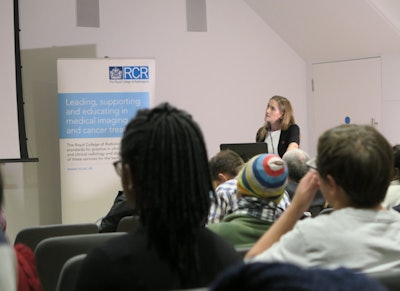 Rockall giving the public lecture at RCR.
Rockall giving the public lecture at RCR.Early career
Rockall moved to the U.K. from Canada while she was still in secondary school. She studied medicine at King's College London, and then did an internal medicine rotation, passing her Membership of the Royal College of Physicians UK (MRCP) exams prior to going into radiology.
"From my perspective, my biggest personal achievement during training was being awarded the Royal College of Radiologists' Rohan Williams Gold Medal for the Fellow of Royal College of Radiologists (FRCR) examination in 1997. I took the final oral exam when I was 38 weeks pregnant with my first child -- and I think I was so desperate not to fail that I overcompensated on the preparation!" she said.
Mentors have also played an important role in Rockall's career. One of her earliest mentors was Prof. Rodney Reznek at St Bartholomew's Hospital.
"It was through Prof. Reznek that I developed my love of gyne-oncology imaging and academic radiology. Whilst a young consultant at Barts, I had the joy of teaching and supervising superb fellows, many of whom I still work with today, through the radiological societies but also through collaboration in research and educational projects," she said. "More recently, my mentor has been Prof. Fiona Gilbert who will always pick up my calls! I've had huge support from my husband and two boys over the years as well as from many close radiology friends -- my radiology family!"
| Professional highlights: |
| President of the International Cancer Imaging Society (ICIS) 2016
Wilhelm Röntgen Honorary Lecture European Congress of Radiology Vienna, March 2016 |
| Chair, Imaging Interpretation Quiz
European Congress of Radiology Vienna, March 2016 |
| New Horizons Lecture
Society of Abdominal Radiology Florida, March 2019 |
| Honorary Membership of the French Society of Radiology in 2021 and the German Röntgen Society in 2022. |
Brexit's impact
Rockall has also enjoyed teaching on courses over the years, allowing her to travel to many interesting countries where she has met radiologists from a wide variety of backgrounds and settings. She believes that inspiring events are the best format for learning and has endeavoured to bring a friendly, open, and fun atmosphere to all her courses.
On a more somber note, she reflected on Brexit's influence on radiology, which, from her personal point of view, has been unfortunate.
"Brexit makes it much more complex and difficult to support observers and visitors to the department, as well as PhD students or research fellowships from Europe. The COVID pandemic has not helped, but Brexit is the ongoing issue. Also, for the NHS as a whole, we have very significant staffing gaps which Brexit has made much worse, and it is not easy to recruit now to the U.K.," she said.
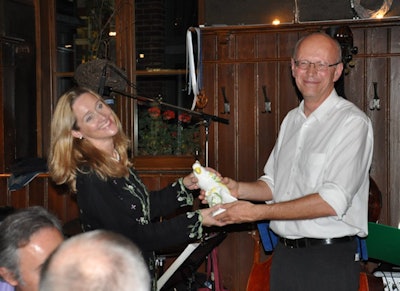 Andrea Rockall becoming the President of the International Cancer Imaging Society (ICIS).
Andrea Rockall becoming the President of the International Cancer Imaging Society (ICIS).Audit support
Rockall still takes an interest in the National Societies Committee, now chaired by Dr. Christian Löwe, as much of the committee's ongoing work began while she was at the helm. One current project is to promote clinical audit across Europe.
"The U.K. has a long-established audit program, with every junior doctor obliged to perform one audit per year as part of their training in quality improvement. The Royal College of Radiologists also coordinates a national audit program. However, not every country has one, even though audit is now a legal requirement within the E.U.," Rockall noted.
In a bid to support audit, the ESR centrally coordinated an audit about patient safety last September, thus gaining information about audit infrastructure.
The short survey about whether respondents used a patient safety checklist before interventional procedures produced 136 responses, most from countries with an established audit infrastructure. Some countries used checklists from the World Health Organization (WHO) or the Cardiovascular and Interventional Radiological Society of Europe (CIRSE), while some used their own in-house checklists or are still in the process of developing one. A number of respondents indicated that they used a checklist but that they had no time for -- or help with -- auditing its usage.
The committee has decided to reaudit in the autumn of 2022 and is hoping to significantly push up the number of responses and the proportion that are using and auditing the use of a patient safety checklist prior to IR procedures.
In addition to asking if there is a checklist in place, the survey will also ask if there is an audit lead, and if respondents have enough time or administrative support to perform clinical audit.
"The longer-term plan is to survey societies and patient advisory groups to help choose important topics to audit. Then, once a year, the National Societies Committee will circulate a multinational audit through the ESR," Rockall said. "We have to find ways to kick audit off. Like women's football, audit has been a slow burn, but also like the football, we can finally make it to Wembley."




